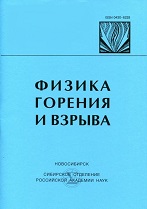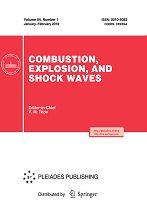|
This article is cited in 1 scientific paper (total in 1 paper)
Ignition delay of fluorinated ethylene propylene wire insulation in a forced flow field in microgravity
K. Wanga, J. Fanga, J.-W. Wanga, S.-M. Zhenga, J.-F. Guanb, H. R. Shaha, J.-J. Wanga, Y.-M. Zhanga
a University of Science and Technology of China, 230026, Hefei, Anhui, China
b Tsinghua University, 230601, Hefei, Anhui, China
Abstract:
Fluorinated ethylene propylene (FEP) wire insulation ignition is investigated in a forced flow field in microgravity and normal gravity with a continuous current. First, FEP insulation melts and decomposes, causing jet bursting in both normal gravity and microgravity. Second, the forced flow and gravity produce minor effects on the core heating and bursting time, while the pyrolysis time increases slightly with increasing air velocity. Third, the positively stretch rates in terms of the velocity gradients are higher in microgravity. Both the forced flow and gravity have significant effects on the induction time, which is dependent on the stretch rate and Damköhler number. The induction time increases with increasing air velocity, and it is higher in microgravity. Finally, the ignition delay time is dominated by the core heating and bursting time, while its bigger value and faster increase in microgravity with increasing air velocity are dominated by the induction time.
Keywords:
microgravity, ignition, FEP wire insulation, bursting jet, stretched flow.
Received: 13.01.2020
Revised: 19.02.2020
Citation:
K. Wang, J. Fang, J.-W. Wang, S.-M. Zheng, J.-F. Guan, H. R. Shah, J.-J. Wang, Y.-M. Zhang, “Ignition delay of fluorinated ethylene propylene wire insulation in a forced flow field in microgravity”, Fizika Goreniya i Vzryva, 56:4 (2020), 46–55; Combustion, Explosion and Shock Waves, 56:4 (2020), 412–420
Linking options:
https://www.mathnet.ru/eng/fgv693 https://www.mathnet.ru/eng/fgv/v56/i4/p46
|


| Statistics & downloads: |
| Abstract page: | 45 | | Full-text PDF : | 21 |
|





 Contact us:
Contact us: Terms of Use
Terms of Use
 Registration to the website
Registration to the website Logotypes
Logotypes








 Citation in format
Citation in format 
